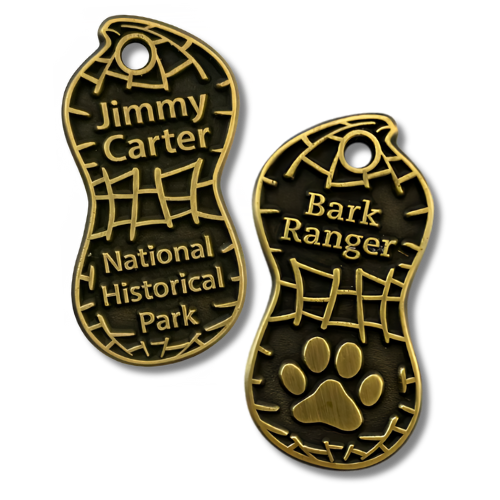
Be a BARK Ranger!Our goal is to help you and your furry friend enjoy your visit while preserving the park's natural beauty and historical integrity. By following the BARK Ranger code, you ensure a safe and enjoyable experience for everyone. Here’s how:
Once verified, your pet will receive a BARK Ranger pet tag and certificate as a token of appreciation for their exemplary behavior. B.A.R.K. Ranger CodeBag your pets waste.Please make sure that your pet, like you, Leaves No Trace. Dog feces is not a natural fertilizer. Dogs can carry disease such as parvovirus, giardia and roundworms into the park's wildlife and farm population. Water sources may also be polluted by dog feces. Always leash your pet.Pets must be restrained on a leash no longer than 6 feet (2 m); retractable leashes extended beyond this limit are prohibited. Uncontrolled dogs can present a danger to other visitors. Leashes also protect the experience of other visitors who may be afraid, allergic, or who do not want a dog approaching them. Respect Wildlife.The Jimmy Carter National Historical Park is home to diverse wildlife and farm animals. Maintaining a respectful distance helps keep these animals safe and stress-free. Know Where You Can Go.Pets are welcomed in most outside areas, except in buildings. Pets should not be left unattended. Summer heat poses a threat to pets in vehicles. Never leave pets alone in a car. Where Can Your Pet Go at the Jimmy Carter National Historical Park?Pets Are Allowed:
Pets Are Not Allowed:
Service AnimalsDogs classified as service animals are individually trained to perform a specific task that assists a person with a disability. Service dogs are legally permitted anywhere that visitors can go. Emotional support, therapy, and companion animals, as well as service animals in training, are not service animals and must abide by all pet regulations.
National Park Service / Laura Kuyat Pet SafetySummer brings intense heat that can be dangerous for our furry friends. It's essential to take extra precautions to ensure your pets stay safe and comfortable. Here are some crucial tips and information to help you protect your pets from the heat.
By taking these precautions, you can help ensure that your pets stay safe and healthy during the hot summer months. Always be mindful of the heat and make necessary adjustments to keep your furry friends cool and comfortable. |
Last updated: August 29, 2024
